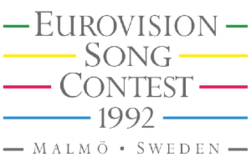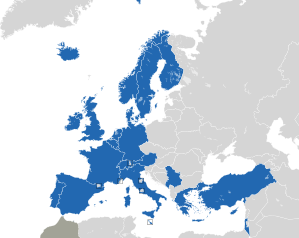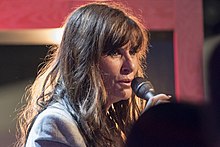
The Eurovision Song Contest 1965 was the tenth edition of the annual Eurovision Song Contest. It took place in Naples, Italy, following the country's victory at the 1964 contest with the song "Non ho l'età" by Gigliola Cinquetti. Organised by the European Broadcasting Union (EBU) and host broadcaster Radiotelevisione italiana (RAI), the contest was held at Sala di Concerto della RAI on 20 March 1965, and was hosted by Italian singer Renata Mauro.

The Eurovision Song Contest 1967 was the 12th edition of the annual Eurovision Song Contest. It took place in Vienna, Austria, following the country's victory at the 1966 contest with the song "Merci, Chérie" by Udo Jürgens. Organised by the European Broadcasting Union (EBU) and host broadcaster Österreichischer Rundfunk (ORF), the contest was held at the Großer Festsaal der Wiener Hofburg on 8 April 1967, becoming the first contest held in the month of April, and was hosted by Austrian actress Erica Vaal.

The Eurovision Song Contest 1995 was the 40th edition of the Eurovision Song Contest, held on 13 May 1995 at the Point Theatre in Dublin, Ireland. Organised by the European Broadcasting Union (EBU) and host broadcaster Radio Telefís Éireann (RTÉ), and presented by Mary Kennedy, the contest was held in Ireland following the country's victory at the 1994 contest with the song "Rock 'n' Roll Kids" by Paul Harrington and Charlie McGettigan. It was the third consecutive contest to be held in Ireland – the first and only time in the history of the event that a country has hosted three editions in a row – and the second consecutive edition to be held in the Point Theatre in Dublin.

The Eurovision Song Contest 1994 was the 39th edition of the Eurovision Song Contest, held on 30 April 1994 at the Point Theatre in Dublin, Ireland. Organised by the European Broadcasting Union (EBU) and host broadcaster Radio Telefís Éireann (RTÉ), and presented by Cynthia Ní Mhurchú and Gerry Ryan, the contest was held in Ireland following the country's victory at the 1993 contest with the song "In Your Eyes" by Niamh Kavanagh. It was the first time that any country had hosted two successive editions of the contest, following the previous year's contest held in Millstreet.

The Eurovision Song Contest 1993 was the 38th edition of the Eurovision Song Contest, held on 15 May 1993 at the Green Glens Arena in Millstreet, Ireland. Organised by the European Broadcasting Union (EBU) and host broadcaster Radio Telefís Éireann (RTÉ), and presented by Fionnuala Sweeney, the contest was held in Ireland following the country's victory at the 1992 contest with the song "Why Me?" performed by Linda Martin.
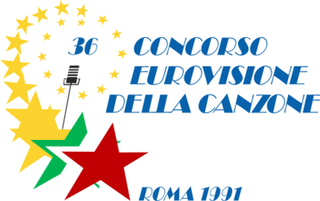
The Eurovision Song Contest 1991 was the 36th edition of the Eurovision Song Contest, held on 4 May 1991 at Stage 15 of the Cinecittà Studios in Rome, Italy. Organised by the European Broadcasting Union (EBU) and host broadcaster Radiotelevisione italiana (RAI), and presented by Gigliola Cinquetti and Toto Cutugno, the contest was held in Italy following the country's victory at the 1990 contest with the song "Insieme: 1992" by Toto Cutugno.

The Eurovision Song Contest 1990 was the 35th edition of the Eurovision Song Contest, held on 5 May 1990 in the Vatroslav Lisinski Concert Hall in Zagreb, Yugoslavia. Organised by the European Broadcasting Union (EBU) and host broadcaster Radiotelevizija Zagreb on behalf of Jugoslavenska radiotelevizija (JRT), and presented by Oliver Mlakar and Helga Vlahović, the contest was held in Yugoslavia following the country's victory at the 1989 contest with the song "Rock Me" by the group Riva. It was the first contest to be held in the Balkans and the only to be held in a socialist state.

The Eurovision Song Contest 1989 was the 34th edition of the Eurovision Song Contest, held on 6 May 1989 in the Palais de Beaulieu in Lausanne, Switzerland. Organised by the European Broadcasting Union (EBU) and host broadcaster Télévision suisse romande (TSR) on behalf of the Swiss Broadcasting Corporation, and presented by Jacques Deschenaux and Lolita Morena, the contest was held in Switzerland following the country's victory at the 1988 contest with the song "Ne partez pas sans moi" by Céline Dion.
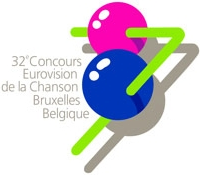
The Eurovision Song Contest 1987 was the 32nd edition of the annual Eurovision Song Contest. It took place in Brussels, Belgium, following the country's victory at the 1986 contest with the song "J'aime la vie" by Sandra Kim. Organised by the European Broadcasting Union (EBU) and host broadcaster Radio-télévision belge de la Communauté française (RTBF), the contest was held at the Centenary Palace on 9 May 1987 and hosted by French-Belgian singer Viktor Lazlo.

The Eurovision Song Contest 1985 was the 30th edition of the Eurovision Song Contest, held on 4 May 1985 in the Scandinavium in Gothenburg, Sweden. Organised by the European Broadcasting Union (EBU) and host broadcaster Sveriges Television (SVT), and presented by Lill Lindfors, the contest was held in Sweden following the country's victory at the 1984 contest with the song "Diggi-Loo Diggi-Ley" by Herreys.

The Eurovision Song Contest 1988 was the 33rd edition of the annual Eurovision Song Contest. It took place in Dublin, Ireland, following Johnny Logan's win at the 1987 contest with the song "Hold Me Now". Organised by the European Broadcasting Union (EBU) and host broadcaster Radio Telefís Éireann (RTÉ), the contest was held at the RDS Simmonscourt on 30 April 1988 and was hosted by Irish broadcaster Pat Kenny and the Miss Ireland 1980 Michelle Rocca, marking the first time since the 1979 contest that two presenters had hosted the contest.

The Eurovision Song Contest 1973 was the 18th edition of the annual Eurovision Song Contest. It took place in Luxembourg City, Luxembourg, following the country's victory at the 1972 contest with the song "Après toi" by Vicky Leandros. Organised by the European Broadcasting Union (EBU) and host broadcaster Compagnie Luxembourgeoise de Télédiffusion (CLT), the contest was held at the Grand Théâtre on 7 April 1973 and was hosted by German television presenter Helga Guitton.

The Eurovision Song Contest 1974 was the 19th edition of the Eurovision Song Contest, held on 6 April 1974 in the Dome in Brighton, United Kingdom. Organised by the European Broadcasting Union (EBU) and host broadcaster the British Broadcasting Corporation (BBC), and presented by Katie Boyle, this was the fifth time that the United Kingdom had staged the contest.

The Eurovision Song Contest 1977 was the 22nd edition of the annual Eurovision Song Contest. It took place in London, United Kingdom, following the country's victory at the 1976 contest with the song "Save Your Kisses for Me" by Brotherhood of Man. Organised by the European Broadcasting Union (EBU) and host broadcaster British Broadcasting Corporation (BBC), the contest was held at the Wembley Conference Centre on 7 May 1977, marking the first time the event took place in the month of May since the first contest in 1956. The contest was directed by Stewart Morris and hosted by English journalist Angela Rippon.
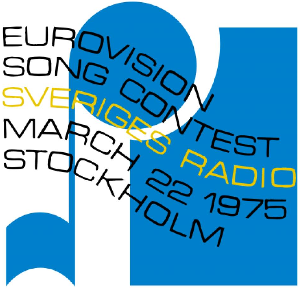
The Eurovision Song Contest 1975 was the 20th edition of the Eurovision Song Contest, held on 22 March 1975 in the Sankt Eriks-Mässan in Stockholm, Sweden and presented by Karin Falck. Organised by the European Broadcasting Union (EBU) and host broadcaster Sveriges Radio (SR), the contest was held in Sweden following the country's victory at the 1974 contest with the song "Waterloo" by ABBA. Nineteen countries were represented at the contest – a new record number of participants. Turkey made its first entry in the contest, and France and Malta returned after a one- and two-year absence, respectively. Greece, after participating for the first time in the previous year's event, opted not to participate in 1975.
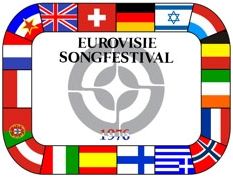
The Eurovision Song Contest 1976 was the 21st edition of the annual Eurovision Song Contest. It took place in The Hague, Netherlands, following the country's victory at the 1975 contest with the song "Ding-a-dong" by Teach-In. Organised by the European Broadcasting Union (EBU) and host broadcaster Nederlandse Omroep Stichting (NOS), the contest was held at the Nederlands Congrescentrum on 3 April 1976 and was hosted by 1957 Dutch Eurovision winner Corry Brokken.

The Eurovision Song Contest 1996 was the 41st edition of the Eurovision Song Contest, held on 18 May 1996 at the Oslo Spektrum in Oslo, Norway. Organised by the European Broadcasting Union (EBU) and host broadcaster Norsk rikskringkasting (NRK) and presented by Ingvild Bryn and Morten Harket, the contest was held in Norway following the country's victory at the 1995 contest with the song "Nocturne" by Secret Garden.

The Eurovision Song Contest 2000 was the 45th edition of the Eurovision Song Contest, held on 13 May 2000 at the Globe Arena in Stockholm, Sweden and presented by Kattis Ahlström and Anders Lundin. Organised by the European Broadcasting Union (EBU) and host broadcaster Sveriges Television (SVT), the contest was held in Sweden following the country's victory at the 1999 contest with the song "Take Me to Your Heaven" by Charlotte Nilsson. With an audience of 13,000 people present, the 2000 contest was the largest yet seen in its history.
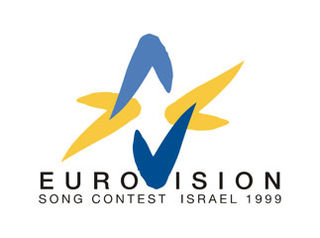
The Eurovision Song Contest 1999 was the 44th edition of the Eurovision Song Contest, held on 29 May 1999 at the International Convention Centre in Jerusalem, Israel. Organised by the European Broadcasting Union (EBU) and host broadcaster Israel Broadcasting Authority (IBA), the contest was held in the country following its victory at the 1998 contest with the song "Diva" by Dana International, and was presented by Dafna Dekel, Yigal Ravid and Sigal Shachmon.

Luxembourg has participated in the Eurovision Song Contest 38 times since its debut at the first contest in 1956. The Luxembourgish national broadcaster, RTL Lëtzebuerg (RTL), participates in the contest representing the country. The nation participated in all but one event between 1956 and 1993, only missing the 1959 contest. After finishing among the bottom seven countries in 1993, Luxembourg was relegated and prevented from competing in 1994. The nation declined to return to the contest in 1995, and would make no further appearances over the next three decades. The country returned to the event for the first time in 31 years in 2024.
